Noor Akbari is on a mission to make education available to everyone, everywhere. As CEO of rosalyn.ai, an artificial intelligence-based proctoring company used by online education platform Coursera and the Department of Defense, he’s well on his way to achieving that mission. Akbari grew up in Afghanistan, where he lived through three wars and several different regime changes. He eventually started the country’s first digital printing company before working as a translator and adviser for the U.S. military.
Removing the barrier of academic integrity
Akbari relocated to the United States in 2007 to work for a defense company. While there, his entrepreneurial spirit blossomed. He started a medical services company, followed by a language assessment company. The latter was spending a ton of money flying test takers to its offices for exam proctoring. To solve that problem, Akbari created a tool that automated the monitoring process remotely.
“The future of learning will be online,” Akbari says. “There are billions of people who don’t have access to quality education. Online education is going to provide that access. It’s going to change the world for the better. But one of the barriers to that changed world is ensuring academic integrity. So, how do we solve that?”
He grew curious as to how higher education institutions approached remote assessment integrity and learned they didn’t really have a good solution. Universities were either not ensuring academic integrity in online exams or they were achieving it through the traditional method of watching people take tests using GoTo Meeting. His entrepreneurial instincts kicked in once again and rosalyn.ai was born with the help of Akbari’s cofounder Martin Jakobsson, a former Microsoft AI research manager.
Since its founding in 2018, rosalyn.ai has built a product that allows universities and other learning organizations to deliver exams all over the world in an easy, accessible and low-cost way that also ensures academic integrity. But the company’s path to success wasn’t always smooth. Akbari and Jakobsson faced several challenges along the way.
Building trust in online education and AI
Akbari notes that online education is growing quickly, spurred by COVID-19. He says the biggest hurdle with its widespread adoption is the public’s belief that a degree earned online is not as valuable as one earned at an in-person institution.
“If we can ensure the integrity of online education in the same way we do in-person education, then it becomes more effective, accessible, flexible and more personalized,” he says. “If we build that trust, then imagine people in Afghanistan, my home country, who don’t have access to quality education locally but all of a sudden can go to Harvard or MIT.”
If the public has misgivings about online education, those doubts are multiplied when AI is involved. As AI continues to reshape the educational landscape, Akbari acknowledges the uphill battle of building trust in the technology. He also understands the hesitancy. While AI holds immense potential in regards to personalized learning, enhanced accessibility and combating disparities in education, it also poses some ethical challenges, particularly when it comes to academic integrity. Akbari advocates for a balanced approach that leverages AI’s capabilities while mitigating its risks through regulation and public policy.
Navigating the pitfalls of startups
According to Harvard Business School, around 90% of startups fail, with 10% failing in the first year. Everything from inability to secure funding to lack of vision to improper product-market fit are all contributing factors to that failure rate. For Akbari and Jakobsson, it was their unwavering conviction in rosalyn.ai’s mission of making education available to everyone, everywhere that propelled them forward. The pair pitched the company to several people before securing their first round of funding from angel investors.
“The earliest challenges were around product-market fit,” Akbari recalls. “How do we build a product that people can trust in early on? How do we solve the right problems? This is a process where you can get carried away; you can build the wrong thing, which is the cause of failure for a lot of startups. This is a very delicate time when you need to get things right.”
He continues: “We were very fortunate to go through an accelerator program called Alchemist, and they taught us how to really hone in on product-market fit and talk to customers and really listen and build things—not because we think it’s a good idea, but it’s what the customers need.”
Akbari’s advice to aspiring entrepreneurs when navigating the startup landscape is to be steadfast in your convictions, embrace resilience and learn from your mistakes. He also encourages people to hone their sales and storytelling skills, as both are critical to a startup’s success.
“If you don’t have the conviction and if you don’t believe in your vision, and if you’re not a little bit crazy about it, don’t start a startup,” he says. “The journey requires a lot of resilience and comes with a lot of challenges that a lot of people are not prepared for.”
Balancing profit and purpose
In our capitalistic society, profit often takes precedence over everything. But Akbari’s journey with rosalyn.ai underscores the power of aligning business objectives with social impact. He acknowledges that there are different kinds of entrepreneurship and some are solely focused on making money rather than having an impact. By marrying profit with purpose, however, entrepreneurs can achieve a profitable impact.
“I believe if you have a vision and that vision is grand enough [to] have wide impact, the incredible thing about capitalism is that you can monetize that as well,” he says. “You don’t have to choose between one or the other.”
“If we can ensure the integrity of online education in the same way we do in-person education, then it becomes more effective, accessible, flexible and more personalized.”
Photo courtesy of Noor Akbari





